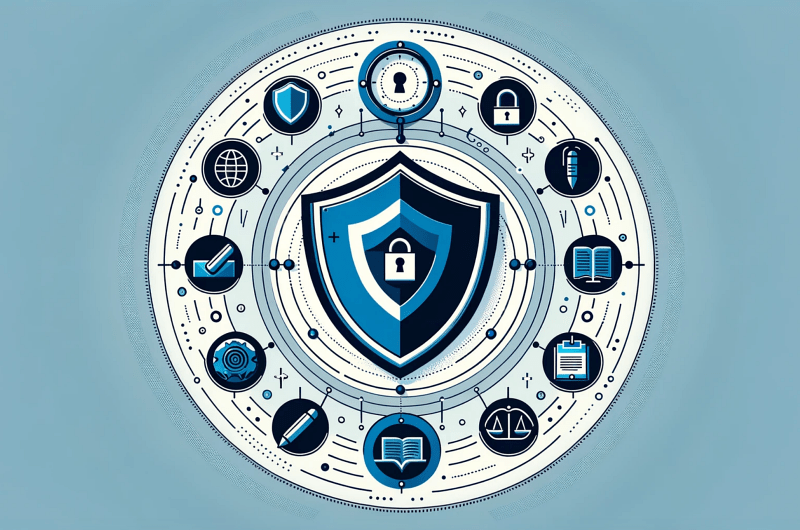In the era of digital transformation, the sanctity of personal data has emerged as a cornerstone of ethical business practices. The digital age has brought with it a new set of challenges and responsibilities for businesses, necessitating a robust framework for data privacy compliance. This framework not only helps in adhering to legal mandates but also plays a pivotal role in building and sustaining trust with consumers. In this comprehensive guide, we delve into the intricacies of data privacy solutions, distinguish between data privacy and data security solutions, and underscore the importance of businesses embracing these practices.
Understanding data subjects, and implementing effective data privacy measures is not merely about compliance; it’s about cultivating a culture of transparency and respect for individual rights. This guide aims to provide a thorough understanding of GDPR, elucidate its core principles, and offer insights into addressing common concerns and challenges related to data privacy.
Understanding Data Privacy Laws and Regulations
People want privacy protections that can help protect their personal information from unauthorized access. Some Privacy Policies do not cover data privacy at a comprehensive level and may include separate data breaches. In today’s digital age, data privacy has emerged as a paramount concern, leading to the implementation of stringent regulations on data classification, like the General Data Protection Regulation (GDPR). Enacted on May 25, 2018, by the European Union, the GDPR represents a landmark move towards empowering individuals with greater control over their personal data while imposing rigorous guidelines on data processing entities.
What are the most effective data privacy solutions and tools for your industry and use cases?
The landscape of data privacy solutions is diverse, offering various tools and technologies designed to make data protection solutions meet the unique needs of different industries.
- Data Mapping and Inventory Tools: These tools are indispensable for organizations looking to gain a comprehensive understanding of how data flows through their systems. They help in identifying where personal data is stored and processed, thereby enabling businesses to implement effective data protection strategies.
- Consent Management Platforms (CMPs): In the wake of stringent regulatory requirements, CMPs have become essential for managing user consents in a transparent and efficient manner. They ensure that user rights are protected while keeping businesses compliant with regulations like GDPR.
- Data Discovery and Classification Tools: These sophisticated solutions automate the process of identifying and classifying sensitive information. By leveraging advanced algorithms, they streamline the management of sensitive data, significantly reducing the risk of data breaches.
- Privacy Impact Assessment Software: Assessing the risks associated with data processing activities is crucial for any data-driven organization. This type of software facilitates informed decision-making by evaluating the potential impacts of data processing on privacy rights.
- Compliance Management Solutions: Automating the compliance lifecycle not only ensures that businesses stay compliant with data privacy laws but also enhances operational efficiency. These solutions integrate seamlessly with existing data ecosystems, bolstering data protection efforts.
Data Privacy vs. Data Security: What’s the Difference?

While data privacy and data security are often used interchangeably, they refer to distinct aspects of personal data processing and protection.
- Data Privacy is concerned with the right use of data, focusing on compliance with legal standards and ethical practices in handling personal information.
- Data Security is about protecting data from unauthorized access, ensuring its confidentiality, integrity, and availability through technological and procedural safeguards.
Understanding the distinction between these two concepts is crucial for businesses to develop comprehensive and data breach protection strategies.
Automation With Data Privacy Management Software
The modern technology stack seems to grow daily, resulting in large amounts of personally identifiable information being taken up and stored across systems. With manual data protection policies, it becomes nearly impossible to build trust and maintain compliance with regulations while simultaneously eliminating risks and gaining new customers. Many companies need software that can automate data privacy and security. The software is capable of utilizing automated processes to aid businesses.
Benefits of Data Privacy Compliance: Why Should You Care?
The advantages of adhering to data protection authorities privacy compliance are manifold.
- Building Customer Trust: In today’s digital landscape, consumers are increasingly aware of their privacy rights. Demonstrating a commitment to protecting these rights can significantly boost a brand’s reputation and customer loyalty.
- Mitigating Legal Risks: Compliance with data privacy laws helps in avoiding hefty fines and legal complications, ensuring smooth business operations.
- Securing a Competitive Advantage: In a marketplace where consumers value privacy, prioritizing data protection can set a business apart, offering a unique value proposition to customers.
What are the 5 pillars of compliance to the data privacy Act?
Understanding the foundational pillars of data privacy compliance is essential for any organization looking to navigate the complexities of data privacy programs and protection laws.
- Lawfulness, Fairness, and Transparency: These principles ensure that data is processed in a manner that is legal, fair, and transparent to the data subject.
- Purpose Limitation: Data must be collected for specific, explicit, and legitimate purposes, and not further processed in a manner that is incompatible with those purposes.
- Data Minimization: The principle of data minimization emphasizes the importance of collecting only the data that is necessary for the specified purposes.
- Accuracy: Maintaining the accuracy of personal data is crucial for respecting the rights of individuals and ensuring the integrity of data processing activities.
- Storage Limitation: Data should not be kept for longer than is necessary for the purposes for which it was collected.
What are the 3 general data privacy principles?
The general principles of data privacy provide a framework for responsible, data collection and handling.
- Transparency: Ensuring that users are fully informed about how their data is used is fundamental to building trust.
- Control: Empowering individuals with control over their personal data is a critical aspect of data privacy.
- Accountability: Organizations must take full responsibility for the data they handle, demonstrating a commitment to privacy through their actions and policies.
What questions are asked in GDPR compliance?

For organizations striving to protect data and to align with GDPR requirements, several key questions are pivotal in evaluating their compliance posture:
- How clear and unambiguous is the consent obtained from individuals? GDPR mandates that consent be freely given, specific, informed, and unambiguous. Organizations must ensure that they have explicit consent to process personal data, especially in contexts where sensitive data is involved.
- Are data subject access requests (DSARs) efficiently and timely handled? Under GDPR, individuals have the right to access their personal data, request correction, or deletion, and even move their data from one service provider to another. Organizations need to have processes in place to promptly respond to these requests.
- Is there lawful, fair, and transparent documentation of processing activities? Keeping detailed records of data processing activities is essential. This includes the purpose of processing, data categories processed, and the legal basis for processing. It’s crucial for demonstrating compliance with GDPR.
- Are privacy by design and default principles incorporated into your data processing activities? GDPR requires that data protection measures are integrated into the processing activities and business practices from the very beginning of the design phase, ensuring that only necessary data is processed.
- How is data confidentiality and integrity ensured? Organizations must implement and maintain robust security measures to protect personal data against unauthorized or unlawful processing, accidental loss, destruction, or damage. This often involves encryption, secure data storage solutions, and regular security assessments.
- Is there a procedure for detecting, reporting, and investigating personal data breaches? GDPR requires prompt notification of data breaches to the relevant supervisory authority and, in certain cases, to the affected individuals, especially if there is a high risk to their rights and freedoms.
- How is data transferred across borders? GDPR imposes restrictions on the transfer of personal data outside the European Economic Area (EEA) to ensure that the level of data protection afforded to individuals is not undermined. Organizations must ensure they have valid mechanisms in place for international data transfers, such as Standard Contractual Clauses (SCCs) or adherence to an adequacy decision.
- Are data protection impact assessments (DPIAs) conducted for high-risk processing activities? For processing activities that pose a high risk to individuals’ rights and freedoms, GDPR requires organizations to carry out DPIAs to identify, assess, and mitigate risks.
Addressing these questions thoroughly can help organizations navigate the complex privacy regulations of GDPR, ensuring they not only comply with the regulation but also demonstrate a commitment to respecting and protecting individual privacy rights.
What is the best possible solution for data confidentiality?
The best approach to ensuring data confidentiality involves a multifaceted strategy:
- Implementing strong encryption for data at rest and in transit to protect against unauthorized access.
- Applying strict access controls to ensure only authorized personnel have access to sensitive data, based on the principle of least privilege.
- Conducting regular security audits to identify and rectify vulnerabilities, thereby preventing potential data breaches.
What is a data security solution?
A data security solution focuses on protecting digital information from unauthorized access, corruption, or theft throughout its lifecycle. This includes a range of technologies and practices such as:
Encryption
Encryption secures data by converting it into a coded format accessible only with a decryption key, ensuring data remains confidential even if accessed by unauthorized individuals. It is data encryption that’s crucial for safeguarding sensitive data, both stored and transmitted.
Firewalls
Firewalls act as digital barriers that control network traffic based on security rules, blocking unauthorized access while permitting safe communication. They’re essential for the access control creating a secure network perimeter.
Antivirus software
Antivirus software detects and neutralizes malware, such as viruses and ransomware, to prevent data corruption and loss protecting sensitive data. Continuous updates are vital for protection against new threats.
Intrusion detection systems
Intrusion Detection Systems (IDS) monitor network and system activities for suspicious behavior, alerting administrators to potential breaches. They help identify and mitigate security incidents in real time.
How do I fix data privacy issues?
To effectively address data privacy issues, organizations should:
- Conduct regular privacy audits to assess compliance and identify areas for improvement.
- Implement a privacy-by-design approach, ensuring that privacy considerations are integral to the development of new products and services.
- Educate employees on the importance of data privacy and their role in protecting sensitive information.
- Stay abreast of compliance requirements and regularly update privacy policies and practices to reflect changes in legislation and industry standards.
- Utilize tools like Pyxos to streamline compliance and governance processes, making it easier to manage and protect personal data.
The Bottom Line: Data Privacy Management Matters
In conclusion, effective data privacy management is more than just a regulatory compliance requirement; it is a strategic asset that fosters trust, drives innovation, and supports business growth. Understanding and implementing the right strategies and tools, such as Pyxos, enables businesses to navigate the complexities of data privacy compliance, protect their customers’ data, and position themselves as leaders in the digital economy.
For businesses aiming to excel in data privacy compliance, adopting solutions that simplify and automate compliance processes offers a significant advantage. Proactive data management and adherence to data privacy standards are crucial for unlocking business potential and earning lasting customer trust.



